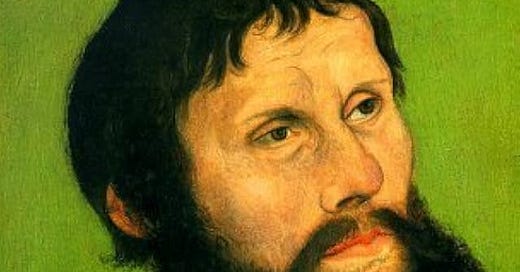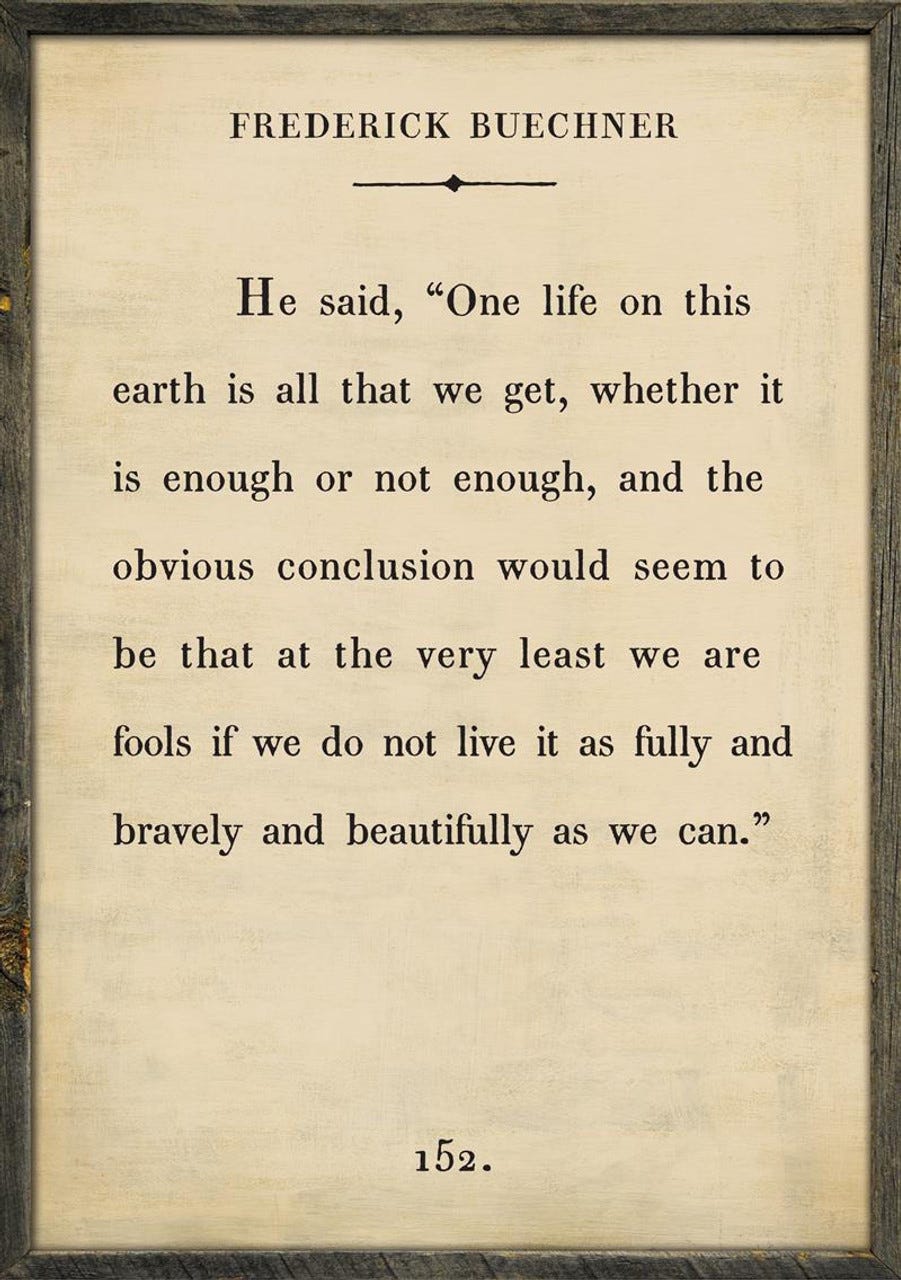I just finished reading an excellent biography on Martin Luther by the late Dutch Reformation historian Heiko Oberman (1930-2001). I remember picking this book up at a Barnes & Noble in 2003. It has sat on my various bookshelves for over twenty years. I decided to pick it up and read it this year, and I am glad I did!
Entitled Luther: Man Between God and the Devil (Image, 1992), Oberman observes: "There is no way to grasp Luther's milieu of experience and faith unless one has an acute sense of his view of Christian existence between God and the Devil: without a recognition of Satan's power, belief in Christ is reduced to an idea about Christ – and Luther's faith becomes a confused delusion in keeping with the tenor of his time." While the premise sounds absurd to the modern ear, I believe that Oberman captures the urgency and crisis Luther felt as he existed in a world of light and darkness, black and white, divine and demonic. Everything Luther does exists in this shadow. There is never a middle ground when everything is on the precipice of either heaven or hell.
Luther vacillated throughout his life because of this bipolar spiritual reality that marked him spiritually, psychologically, and mentally. Is he a prophet or a polemicist? Is he desiring a reform of his existing church (Roman Catholic post-Reformation), or is he forging something new? Are works good for faith, or are they anathema to a people dead in sin? Is Luther a theologian or a tempest?
Furthermore, for those who read and study Luther, did he see something significant happening with his reforms that we’ve made the Protestant Reformation? Or did he see himself simply as a medieval man attempting to address errors of a church he loved? Is medieval even a fair category for Luther or others? We read these epochs back onto church history anachronistically.
This is why I enjoy biographies and memoirs, and I find them essential for doing theology. The late baptist (and he insisted on a lower-case b) theologian and ethicist James McClendon (1924-2000) observed in his work Biography as Theology: How Life Stories Can Remake Today’s Theology (Wipf & Stock, 2002) that biography is essential to theology because
…by recognizing that Christian beliefs are not so many ‘propositions’ to be catalogued or juggled like truth-functions in a computer, but are living convictions which give shape to actual lives and actual communities, we open ourselves to the possibility that the only relevant critical examination of Christian beliefs may be one that begins by attending to lived lives. Theology must be at least biography. If by attending to those lives, we find ways of reforming our own theologies, making them truer, more faithful to our ancient vision, more adequate to the age now being born, then we will be justified in that arduous inquiry. Biography at its best will be theology.
Biography reveals a lot about us and those we study. It reminds us that rather than a simplistic, easily identifiable metanarrative marking our lives as a story, we are often a jumble of questions, failures, struggles, whims of luck, and surprises at where life takes us. Biography helps us understand that life is as much episodic as it is narrative.
What connects those disparate episodes is the lenses through which we interpret our lives. Interpretation becomes the key to making life holy and coherent. When we interpret, we apply standards, we recognize authorities, and we show our cards as to what matters most to us. Biographies and memoirs are literary journeys into what we do, often at the subconscious, every single day. They “give shape to actual lives” and “attend to lived lives.”
Luther wrote extensively, and there are places where I would depart from him (especially regarding justification). But as I read Oberman’s masterful work, I developed an appreciation for this reformer. Oberman applied an interpretive lens that helped make sense of Luther for me. The good, the bad, and the ugly became cogent as I was invited to trust Oberman’s lens and to read Luther through that lens.
This is a good reminder for all of us as we follow Christ in the radical ordinary. Many of us will not be called to become great church reformers, but we’re all interpreting and being interpreted. The church has not fared well in the individualistic West, partly because we’ve lost how lives are shaped and interpreted. We are too close to the subject, so to speak, to be as objective about ourselves as we would like. This is the danger of a society addicted to individuals finding their own story. The peril is that stories are not created this way. A story is a collection of episodes connected by an interpretive framework that makes something compelling emerge.
Perhaps a formational practice we should all lean into is the spiritual art of memoir. Examine your life, put pen to paper (or fingers to keyboard), and then share it with trusted friends and family who will further refine the story. [In a society of chronic loneliness, that last part becomes difficult, snuffing out the light of our stories.] Friends are better for this exercise because, unlike your family, they have no blood obligation to you. Friends choose us, and we choose our friends. Therefore, friends become the most interpretive relationships of our lives.
With friends, be attentive not just to the episodes of your journey. Disconnected episodes do not make a life. Listen for the golden threads and values that connect it all. Skeletons give us structure, but the muscles and sinews hold that skeleton together.
In the end, my questions above about Luther are rather a moot point. Luther was all of the above. There are times I want to strangle him because he’s so black and white (if you disagree with him, you’re of the Devil). But in the end, I relate, even empathize, with him. His triggers are not mine, but I have convictions, traumas, and anxieties that set me off just as easily as he did. Appreciation is not agreement, but it helps to humanize the other and recognize the constellation of presuppositions that precede their actions. We only see the latter; biography helps us capture the former.
Only through biography and memoir are we invited into the “universal particular” employed by the late writer and memoirist Frederick Buechner (1926-2022). Through our faith, friendships, and experiences, we encounter something universal. Below are a few quotes from this literary giant to inspire you on your journey:
“The story of any one of us is in some measure the story of us all.”
“Listen to your life. See it for the fathomless mystery that it is. In the boredom and pain of it no less than in the excitement and gladness: touch, taste, smell your way to the holy and hidden heart of it because in the last analysis all moments are key moments and life itself is grace.”
“You enter the extraordinary by way of the ordinary. Something you have seen a thousand times you suddenly see as if for the first time.”
The church calendar has just entered ordinary time. The ordinary is a great time to discern the interpretive glue that holds your life together. Find the glue to your life, and you’ll find what makes it meaningful!







Thank you for this, Jason! You hit the ball out of the park with this reflection! My first “religious” biography was Yale’s Roland Bainton’s biography of Luther, “Here I Stand” my freshman year of college. Later heard RB preach @ King’s Chapel, Boston, when I was in seminary. My major was church history (regarded by many with amused tolerance in the late ‘60s!), & my major professor taught biographically, which also fit well with Boston University personalism! I read McClendon’s book when it first came out in the ‘70s, @ Buechner is an all-time fav! His writing has a timeless quality about it. His memoirs mean more as I age. Ya done good, Jason . Thanks!